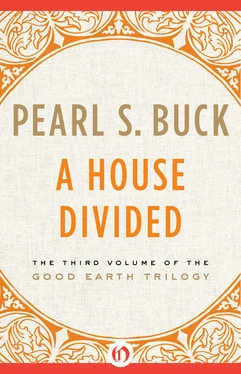Then Yuan remembering, remembered a great blowsy lively country woman he had seen in his uncle’s house the once his father took him there, and how she made merry always, and he wondered to think she must lie still and dead while this little creeping man, his uncle, lived on and on so little changed. He asked, “How did it happen?”
Then the son looked at his father and they were both silent until the Tiger hearing what was asked answered, as if here were a thing which had to do with him, “How did it happen? Why, we have an enemy, our family has, and now he is a little wandering robber chieftain in the hills about our old village. Once I took a city from him in the fairest way, by open guile and siege, but he has not forgiven me for it. I swear he settled near our lands on purpose and he watched for my kin, I know. And this brother of mine is cautious and found out this robber hated us, and he would not go himself to take his share of crops and taxes from the tenants, but he sent his wife, she being only a woman, and the robbers caught her on her homeward way, and robbed her and cut her head off and rolled it down beside the road. I tell my brother, ‘Wait a few months now until I gather up my men again. I swear I’ll search that robber out — I swear I’ll — I swear I’ll …’ ” The Tiger’s voice dragged in weakening wrath and he put out his hand blindly, searching, and the old trusty man standing near put a wine bowl in it and said drowsily, as if from long habit, “Quiet yourself, my general. Do not be angry, lest you grow ill.” And he shifted on his tired old feet and yawned a little and stared happily at Yuan, admiring him.
Now though Wang the Merchant had said nothing during all this tale, when Yuan looked at him to speak some courteous comfort, he was surprised to see his uncle’s little old shining eyes were wet with tears, and still silent, the old man took the edge of first one sleeve and then the other and carefully wiped each eye, and then in his spare stealthy fashion he drew his dry old hand across his nose and Yuan was so astonished he could not speak, to see this cold old man shed tears.
The son saw it, too, and with his small wistful eyes upon his father he said mournfully to Yuan, “The servant who was with her said if she had been silent and more obedient to them they would not have been so quick to kill. But she had a very swift loud tongue and all her life long she had used it as she liked, and she had a temper always quick to boil, and she shouted at the very first, ‘Shall I give you my good silver, you sons of cursed mothers?’ Yes, the servant ran as fast as his feet could take him when she cried so loudly, but when he looked back her head was off already, and we lost the whole of those rents with her for they took everything.”
Thus the son spoke in the evenest little garrulous voice, the words running out one like another in flatness, as though he had his mother’s loose tongue inside his father’s body. But he was a good son, too, who had loved his mother, and now his voice broke and he went out to the court and coughed to ease himself and wipe his eyes and mourn a little.
As for Yuan, not knowing what else to do, he rose and poured a bowl of tea for his uncle and felt himself in a dream here in this room, a stranger with these folk who were his own blood. Yes, he had a life to live they could not conceive, and their life was small as death to him. Suddenly, though why he did not know, he remembered Mary, of whom for a long time he had no thought. … Why now should she come to his mind as clearly as though a door were opened to show her there, as he had been used to see her on a windy day in spring across the sea, her fine dark hair blown about her face, her skin white and red, her eyes their steady grey? She had no place here. This place she could not know. The pictures of his country she had been used to speak of, the pictures she had made for her own mind, were only pictures. It was well, Yuan thought passionately, staring at his father and at these others, sunk back in themselves, now that the first keen edge of meeting was over, — oh, it was very well he had not loved her! He looked about the old hall. There was dust everywhere, the dust long left by a few old careless servants. Between the tiles upon the floor, the green mold grew, and there were stains upon the tiles of spilt wine and of old spittle and of ashes and of dripped greasy food. The broken lattices of shell had been mended with paper, hanging now in sheets, and even in this daylight rats ran to and fro upon the beams above. The old Tiger sat nodding, his warm wine drunk, and his jaw dropped and all his great old body slack and helpless. Above him on a nail his sword hung in its scabbard. Now for the first time Yuan saw it, although he had missed its shining nearness the first moment when he saw his father. It was still beautiful, though sheathed. The scabbard was beautiful in spite of dust in all the carven patterns on it and although the red silken tassels hung down faded and gnawed by rats.
…A h, he was very glad he had not loved that foreign woman. Let her keep her dreams of what his country was! Let her never know the truth!
A great sob rose in Yuan’s throat. … Had the old passed forever from him? He thought of the old Tiger, and of the little shriveled mean-faced man, his uncle, and his son. These, these were still his own and he was tied to them by the blood in his own veins, which he could not spill out if he would. However he might long to be free of all their kind, their blood must run in him so long as he lived.
It was very well that Yuan should know his youth was over and that he must be a man now, and look only to himself, for on that night while he lay alone in the old room where he had slept as a child and as a lad, his guards about him, and where he had sat alone and wept himself to sleep when he ran home from the school of war, the old trusty man came creeping in. Yuan had but just lain himself down to sleep, for his father had made a little feast for him that night and he had bidden his two captains in and they had eaten and drunk together for welcome to Yuan. Afterwards Yuan had let his father lean on him and taken him to his own door before he came to bed himself.
For a while, lying in his bed before he slept, he listened to what he never used to hear, the night sounds of the little town where his father had lived so long encamped. He thought to himself, “If I had been asked I would have said there were no sounds in this little town at night.” And yet there were the barking of the dogs up the street, the crying of a child, a murmur of voices not yet stilled in sleep, a solitary tolling note now and again of some temple bell, and clear and waning above it all, although not near, the crying agony of some woman’s voice seeking for the wandering soul of her child now dying. No sound was loud, for there were silent courts between him and the gate, and yet Yuan, somehow newly keen to everything because he felt himself a stranger here where once he was not strange, heard each separate sound.
Then suddenly there was the squeak of his door upon its wooden hinges and the flare of a candle, and he saw the door open and there was the old trusty man, who bent and set his candle carefully on the floor, and panting a little because his back was stiff he stood again and closed the door and thrust the bar through. Yuan waited, wondering in surprise what he had to say.
He came on his slow old feet up to Yuan’s bed, and seeing Yuan had not drawn the curtains he said, “You are not sleeping, young sir? I have something I must say.”
Then Yuan, seeing how this man’s old body bent at the knees, said kindly, “Sit, then, while you speak.” But the man knew his place and was unwilling for a while, until at last he yielded to Yuan’s kindness, and sat down on the footstool beside the bed and he began to hiss and whisper through his split lip and though his eyes were kind and honest, he was so hideous that Yuan could not bear to see him, however good he was.
Читать дальше












